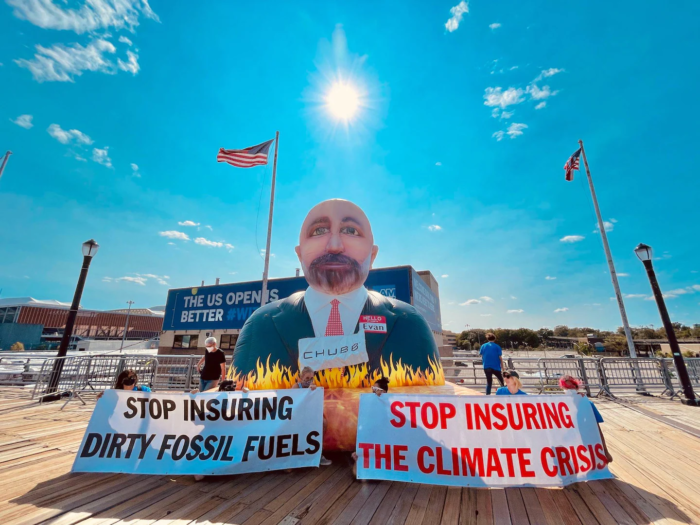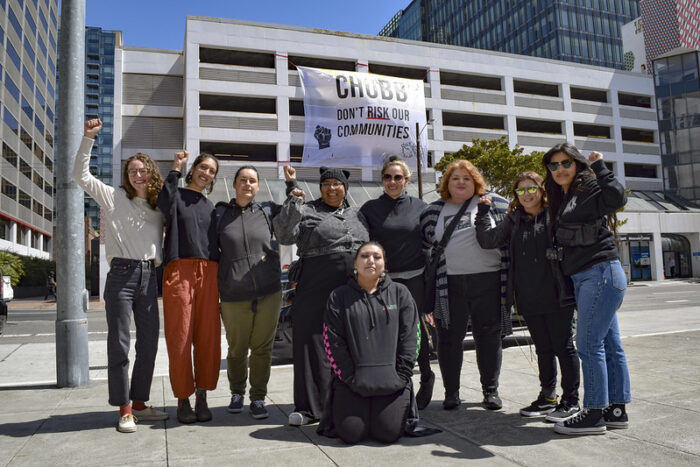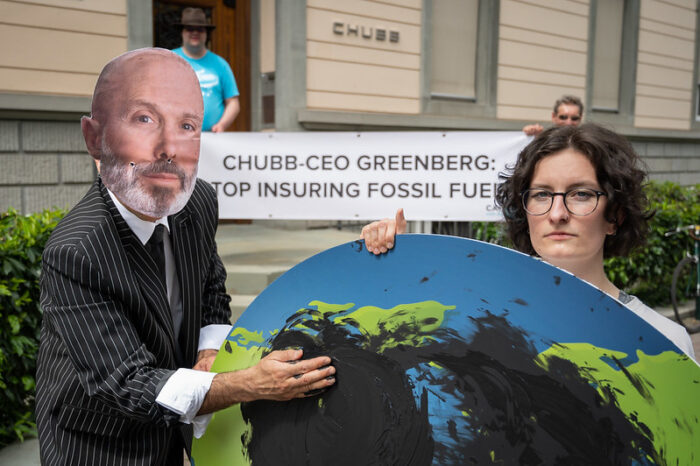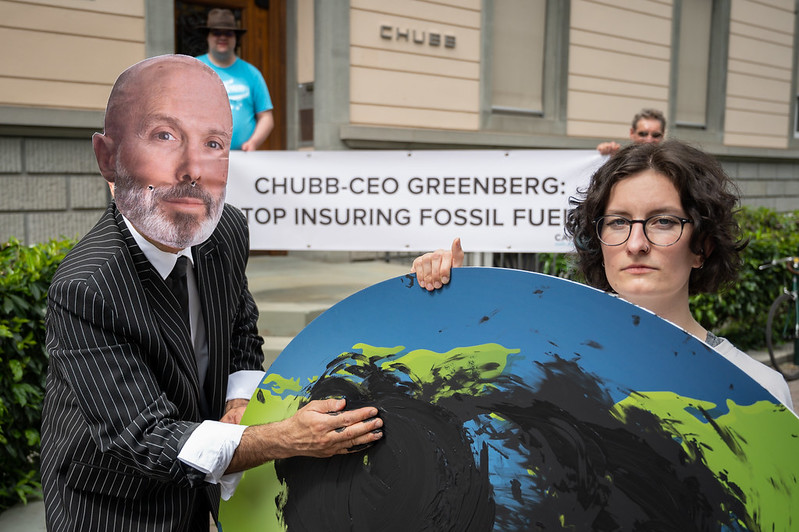Evan Greenberg may not be a household name, but he should be, as CEO of the world’s largest publicly-traded property and casualty insurer: Chubb. Chubb provides insurance coverage for everything from individual homes to multinational corporations, and according to our research, is a top backer of oil and gas projects around the world, including offshore drilling projects, liquefied natural gas (LNG) export terminals, and oil and gas pipelines.
This gives CEO Greenberg enormous power to continue enabling, or to thwart, the fossil fuel industry’s dangerous plans to continue expanding coal, oil, and gas extraction globally.

CEO Greenberg, or CEO Greenwash?
CEO Greenberg has previously been outspoken about the risks posed by climate change to the planet, declaring that Chubb would do its part to be a “steward of the earth” in the face of the climate crisis. But he has failed to translate that rhetoric into action, despite growing pressure from the company’s own investors, frontline communities, climate activists, and politicians.
You’d think Greenberg would listen to Chubb’s shareholders – the ultimate owners of the company – when they call for climate action. But in reality, after a whopping 72% of Chubb shareholder votes supported the company issuing a report on its plans to achieve net zero emissions by 2050, Greenberg publicly rebuffed them. He claimed that it would be legally risky to set a long-term emissions reduction goal, and furthermore, it would be impossible because the company can’t measure the carbon emissions it insures.
But these are flimsy excuses; for example, Chubb hasn’t joined the global efforts through the Partnership for Carbon Accounting Financials and the Net Zero Insurance Alliance to develop a methodology to measure exactly these emissions. Plus, if Greenberg were really committed to decarbonization, there are some critical steps he could take immediately on fossil fuels.
According to Insure Our Future’s sixth annual Scorecard on Insurance, Fossil Fuels, and the Climate Emergency released just last week, Chubb’s fossil fuel policies earned a measly 0.5 out of 10 points – ranking at #20 for underwriting and #22 for investing out of 30 companies. Although Chubb was the first US company to adopt a coal policy in 2019, it hasn’t adopted any other policies restricting support for fossil fuels in the 3+ years since, and that coal policy remains rife with loopholes. While 13 global insurers are restricting support for oil and gas expansion, Chubb is doubling down.
CEO Greenberg sure sounded like CEO Greenwash when he declared, in June 2022, that Chubb has a responsibility to insure oil and gas expansion:
We’re trying to develop an ability to underwrite new [fossil fuel] projects in a scientific-based way where we can determine which ones are done in a more sustainable and responsible way and insure those. – Evan Greenberg
Here’s the thing: the International Energy Agency (IEA) has made it crystal clear that any expansion of fossil fuel infrastructure is incompatible with the goal of limiting global warming to 1.5ºC. “Sustainable” fossil fuel expansion is a complete oxymoron and sounds like some grade-A greenwash to us.
Many of Chubb’s investors would agree. This spring, nearly 20% of shareholder votes called on Chubb to adopt a policy to end support for new fossil fuel projects, a reflection of the fact that in addition to being the right thing to do, it’s also the sound business decision.

What will his legacy be?
Greenberg has a choice to make: will he continue to enable the fossil fuel industry’s expansion agenda through Chubb’s insurance services and investments, or will he instead restrict Chubb’s support for fossil fuel expansion and accelerate a just energy transition? The longtime Chubb CEO still has the opportunity to step up and establish his legacy as a climate leader, but the clock is ticking.
We’ll be watching these specific decisions very closely to see where he lands, before it’s too late:
Oil and gas drilling in the Arctic: Chubb has refused to rule out insurance coverage for Arctic oil and gas drilling and previously insured seismic testing on the coastal plain of the Refuge, which tests for oil and gas reserves. The Gwich’in Steering Committee has called on global insurers, including Chubb, to protect the Arctic National Wildlife Refuge from the harms of fossil fuel development, but Chubb has refused to adopt a policy, unlike 17 other companies. Will Chubb step up and rule out insurance for Arctic drilling?
The East African Crude Oil Pipeline (EACOP): If constructed, EACOP would be the longest heated crude oil pipeline in the world, transporting oil 1443 kilometers from Uganda to Tanzania and emitting an estimated 34 million tonnes of carbon emissions annually at peak production. The project has already displaced thousands and threatens the water resources and livelihoods of millions of people. To date, 18 insurers have ruled out support for the project due its massive risks – is Chubb #19?
Ichthys LNG: Back in 2012, Chubb insured the construction of Ichthys LNG, a massive liquefied natural gas facility in Australia. Now Ichthys is planning a huge expansion to extend the project’s lifeline through 2060 and process significantly more fossil gas. It remains to be seen if Chubb will continue to support this climate-wrecking project, locking in decades of emissions that the climate cannot afford.
Offshore drilling in Brazil: Chubb is one of the biggest insurers of Petrobras, Brazil’s state-owned energy company, which extracts around 93% of the country’s oil and gas. Offshore oil and gas drilling in Brazil is slated to expand oil production by up to 70% over the next decade, threatening some of the world’s most sensitive ecological sites around the Great Amazon Reef. Is Chubb going to keep supporting Petrobras as it ramps up offshore oil and gas production?

Let’s keep the pressure on
In 2021, RAN and partners in the Trans Mountain insurance campaign held Chubb accountable for its role as a major insurer of the Trans Mountain tar sands oil pipeline. With your help, we bombarded the company with hundreds of phone calls, thousands of emails and calendar invites, and actions at offices around the globe and at the Chubb-sponsored US Tennis Open, where NYC activists deployed a 15-foot inflatable of CEO Greenberg’s head.
In response to this groundswell of grassroots pressure, Chubb backed out of Trans Mountain, announcing that it had stopped insuring all tar sands projects in September 2021. In the spring of 2022, the company confirmed it does not plan to insure any tar sands projects moving forward. However, despite these steps in the right direction, Chubb remains deeply entangled with the oil and gas industry beyond tar sands. It is also steadfast in its refusal to meet with Indigenous leaders and frontline communities impacted by its insurance and investment practices. That’s why we are escalating the pressure and spreading the word about CEO Greenberg.
Take action today and urge CEO Greenberg to stop enabling fossil fuel expansion – for communities, the climate, and his legacy.












